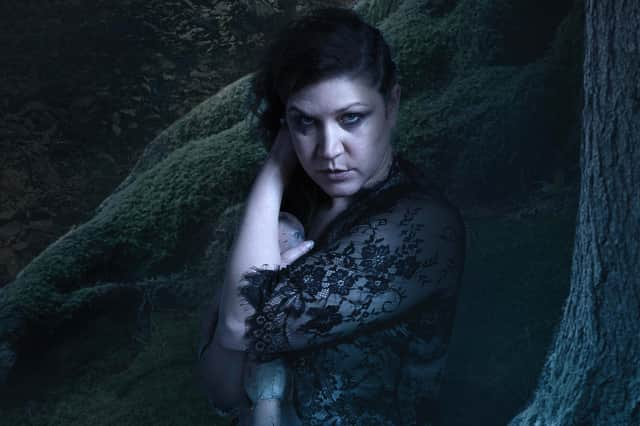Medea remixed for Bard in the Botanics


This summer's Bard in the Botanics season has been hit by two intriguing coincidences. Both are the result of the pandemic and both made the company think twice.
The first is to do with The Tempest. The Glasgow company is staging Shakespeare's late play in the Kibble Palace glasshouse in a stripped-down version for just four actors. Is will be adapted and directed by Nicole Cooper, who has been thinking about the idea for at least four years.
Advertisement
Hide AdThe intention was to stage it in 2020, but then two things happened. First came Covid-19, which we all know about. Second came the Tron Theatre's all-female production of the same play last year. And who landed the lead role of Prospero, the wise old conjurer ruling over an empty island? Why, none other than Cooper herself.
"It’s a story she's always been fascinated by," says Gordon Barr, the season's artistic director. "Once she was cast by the Tron, I asked her if she wanted to come back to The Tempest so quickly, but her take – in a very Bard in the Botanics way – is so different. She said, 'No, I still have my version that I want to tell.’"
It was not how they planned it, but it means Cooper will be exceptionally well prepared when she goes into rehearsals with Adam Donaldson as Caliban, Alan Steele as Prospero, Jennifer Dick as Ariel and Lynsey-Anne Moffat as Miranda.
Cooper is also tied up with the second coincidence. To mark the 20th anniversary of Bard in the Botanics, Barr thought it would be good to extend the repertoire. Apart from the odd excursion into other Renaissance playwrights, the company has always focused on Shakespeare. Perhaps now would be a good time to explore classics from an even earlier era.
"We wanted to expand the kind of stories we tell," says Barr. "The next natural move was to look at other classical stories. Something made sense about going back to the birth of modern drama."
With that in mind, he approached playwright Kathy McKean to see if she fancied adapting a Greek tragedy. They quickly settled on Medea by Euripides and immediately thought of Cooper to play the lead. She had just played Hamlet to startling effect and was ready for the next challenge. Taking on the role of a woman who murders her children in an act of vengeance against her treacherous husband seemed like just the ticket.
Advertisement
Hide AdWhat they could not have foreseen, in another accident of pandemic-related timing, is that the National Theatre of Scotland's production of the same play, in the version by Liz Lochhead, will now also appear this summer at the Edinburgh International Festival. "It wasn't the best news ever," laughs McKean. "My biggest fear was the comparison."
But the opposite is surely the case. Fans of Greek drama will relish the chance to see the two productions in close succession. Serious completists will also be able to take a punt on the Edinburgh Fringe where they will find Medea the Musical ("a rock concert in a courtroom") and The Childless Land, billed as "Medea in space".
Advertisement
Hide Ad"We're talking about a play that's constantly revived," says McKean, recalling that Medea was championed by the suffragette movement. "I wouldn't argue that what she does is a feminist action, but the taking back control of a narrative is. She speaks about the experience of women, the eradication of choice and the danger in the domestic and public space."
Writing with the lead actor in mind gave McKean a tremendous boost. "Nicole is extraordinary," she says. "Knowing what she can do and the effect she has on an audience is such a gift – and also, of course, a challenge to write words worthy of her."
She adds: "We had the unexpected luxury of time in an evolving political landscape in which some of the issues spoke very personally to her. More and more it seemed like serendipity."
Barr wanted to avoid the stiltedness of some published translations of the 2,400-year-old play and turned to McKean for something more immediate. He is delighted by the results. "The play was due to go on in our 2020 season, so we have had nearly three years working on the text," he says. "We're now seeing how easy the actors find it to perform – easy in the sense that it flows naturally and shapes the journey the actor wants to go on, yet there is space for interpretation. It feels like a contemporary drama and yet it does justice to the epic quality and the poetry of the original as well."
Even if the language is of today, this is not a jarring update. The moral universe remains that of Euripides and his story is played out on a grand scale. "I don't want it to be the story of a woman whose husband leaves her and she goes crazy," says Barr. "It's bigger than that. It is a myth and Medea is a demi-god."
Also in the season are two comedies, A Midsummer Night's Dream and Much Ado About Nothing, offering light relief after the era of lockdown. "We just wanted to give the audience a really good time – that utter joy that outdoor Shakespeare can bring," says Barr. "We wanted something that leaves you with your heart full and feeling the world is a better place than we sometimes think it is."
Medea runs from 23 June–9 July; The Tempest from 14–30 July, see https://www.bardinthebotanics.co.uk/